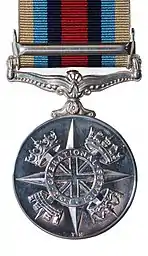Operational Service Medal for Afghanistan
The Operational Service Medal for Afghanistan is a campaign medal currently awarded by the Ministry of Defence of the United Kingdom for service by British Armed Forces personnel in support of the post-2001 Afghan War.
| Operational Service Medal - Afghanistan | |
|---|---|
  Operational Service Medal for Afghanistan | |
| Type | Military Campaign Medal |
| Awarded for | Campaign service |
| Description | Silver disk, 36mm diameter |
| Presented by | the United Kingdom |
| Eligibility | Members of the United Kingdom armed forces |
| Campaign(s) | Afghanistan 2001 to date |
| Clasps |
|
| Status | Currently awarded |
| Established | 2003 |
Operational Service Medal

The Operational Service Medal (OSM) was established in 1999 to replace the General Service Medal (1962) for all new operations. A separate medal of the same design is awarded for each campaign, differentiated by a distinct ribbon.[1] It has been awarded for four separate campaigns:[2]
- Afghanistan (from 11 September 2001)
- Sierra Leone (May 2000 – July 2002)
- Democratic Republic of Congo (June – September 2003)
- Iraq and Syria (Dates to be confirmed)[3]
From 2008, British service personnel could receive the General Service Medal (2008) for participation in smaller operations that do not justify the award of the Operational Service Medal.[2]
Qualifying criteria
The Operational Service Medal for Afghanistan can be awarded both with and without a clasp inscribed 'AFGHANISTAN'.[1]
The criteria for the award of the medal and the clasp are complex and depend on length and area of service:[4]
- To qualify for the clasp, personnel must have served continuously for either 5, 21, or 30 days, depending on the Operation participated in and the dates served. The principal operations were: Operation Veritas (11 September 2001 – 28 February 2002); Operation Herrick (1 March 2002 – 31 December 2014); Operation Fingal (1 December 2001 – 20 September 2004); Operation Landman (11 September 2001 – 1 June 2004)[5] and Operation Toral (1 January 2015 to a date to be decided).[6]
- Qualification for the medal without the clasp depends on service of varying lengths on operations, for example on operations Landman, Oracle, Ramson and Damien. The medal without clasp can also be awarded for service outside Afghanistan that directly supports ongoing operations in Afghanistan including, at various times, service in Pakistan, Uzbekistan, Kenya, Diego Garcia, Saudi Arabia and the Gulf.[6]
There is no minimum qualifying period for those killed, wounded or disabled during operations, or where a recipient is decorated for operational service (including a mention in dispatches and a Queen’s Commendation).[7]
Qualifying service for the Operational Service Medal counts towards the period required to receive the Accumulated Campaign Service Medal.[2]
Medal
The medal is silver and circular in shape and designed as follows:[2]
- The obverse shows the crowned effigy of Elizabeth II with the inscription ELIZABETH II DEI GRATIA REGINA FID. DEF..
- The reverse bears the Union Flag, surrounded by the inscription FOR OPERATIONAL SERVICE and the four major points of the compass with, between the points, four Coronets: Royal (top left), Naval (Navy, top right), Mural (Army, bottom left), and Astral (Royal Air Force, bottom right).
Clasp
The "Afghanistan" Clasp is awarded for service specifically in Afghanistan. A silver rosette on the ribbon denotes entitlement to the clasp when no medal is worn.
There are four variants of the 'Afghanistan' clasps to date:
- The first issue from 2002–2004 – the clasp had a smooth background behind the inscription.
- From 2005 to date, from Operation Herrick onwards – the clasp has a 'dappled' effect behind the inscription, similar to the 'Northern Ireland' clasp on the General Service Medal 1962–2007.
- During 2009, 1,000 medals were awarded with a third type of background. These were manufactured by Gladman & Norman Ltd under a one-off contract in response to increased demand.
- From May 2018 a standard background was adopted by the MoD Medal Office, this background is used on all clasps produced since that date including Afghanistan.
The medal is also awarded to UK civilians employed on Ministry of Defence contracts in support of the British Forces in Afghanistan. Qualifying criteria are the same as HM Forces. The recipient's name and title (Mr, Mrs etc.) are engraved on the edge of the medal, whereas the military recipients have their rank, name and service number. British Government contractors who work in Afghanistan but who are ineligible for the Operational Service Medal may be entitled to the Civilian Service Medal (Afghanistan).[8]
Ribbon
The ribbon consists of a broad central red stripe, flanked each side by a stripe of navy blue and one of light blue, to represent the three services, with an outer stripe of light brown, to represent the Afghan landscape.[2]
See also
References
- John Mussell (ed). Medal Yearbook 2015. p. 198. Published by Token Publishing Ltd. Honiton, Devon.
- "Operational Service Medal for Afghanistan". MOD Medal Office. Retrieved 2010-05-22.
- "Medals: campaigns, descriptions and eligibility, Announcements Operational Service Medal Iraq & Syria". UK MOD. 20 August 2018. Retrieved 15 October 2018.
- "Operational Service Medal for Afghanistan". Amendments to Command Paper 5939, Sept 2003. Retrieved 2018-02-14.
- "Honours and Awards in the Armed Forces (JSP 761) (V5.0 Oct 16). Para 8A1.19, pages 8A1-4 to 8A1-5". MoD Joint Services Publication. Retrieved 2018-02-19.
- "Honours and Awards in the Armed Forces (JSP 761) (V5.0 Oct 16). Paras 8A1.06 to 8.A2.05, pages 8A1-1 to 8A2-1". MoD Joint Services Publication. Retrieved 2018-02-19.
- "Honours and Awards in the Armed Forces (JSP 761) (V5.0 Oct 16). Paras 8A1.11 to 13, page 8A1–3". MoD Joint Services Publication. Retrieved 2018-02-19.
- The Civilian Service Medal (Afghanistan), Cm 8094, The Stationery Office, June 2011.